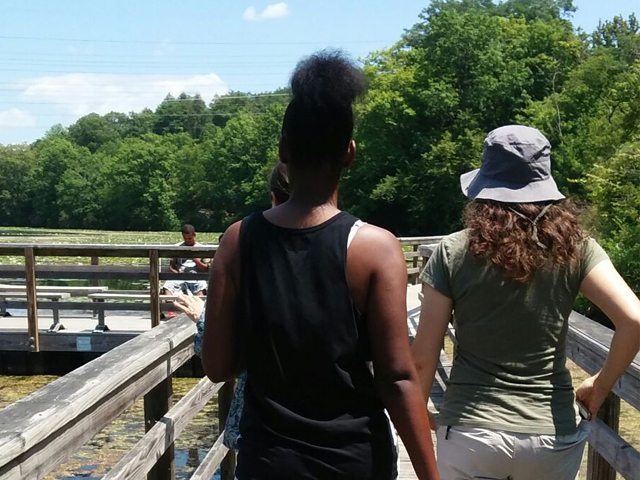Walking with women who have been victims of trafficking is a key part of the ministry of presence.

In addition to being community in a safe house to women who are victims of trafficking, Sister Melissa Camardo volunteers for LifeWay Network Safe Housing Program. During a 5K run, among other duties, she was the official timekeeper at the finish line.
Ministry of presence for Sister Melissa
After 15 years in health ministry – the last six as a vice president of mission and the last two as part of the administrative team spearheading the construction and opening of the new Saint Joseph Hospital, Denver – Sister Melissa Camardo was ready for a new chapter in her life. What she found is a mutually transforming opportunity to serve others through a collaborative initiative addressing modern-day slavery.
Along with two other women religious, Sister Melissa is a member of the host community of a safe house in New York City that harbors women who are victims of trafficking. The LifeWay Network Safe Housing Program is the only one in the metro New York area offering safe housing for survivors of both labor and sex trafficking, both domestic and foreign-born survivors. Representatives of 30 religious communities initially came together to assess needs associated with the huge issue of trafficking. They settled on housing and education/awareness as their focal points. The network now has four safe houses offering long-term housing or emergency safe spaces.
Ministry of presence
The role of the women religious in the safe house is a ministry of presence. In the house where Sister Melissa lives, the Sisters are community to up to five guests; overall, LifeWay Network provides over 20 beds. “We listen, share meals and do things together,” she explains. “We provide a home and community for these women who may not have anyone they trust or who cares about them. When they come home, we greet and treat them like family.”
Referrals come to Lifeway House via the human trafficking court, law enforcement and social service agencies that provide case management for the women. They range in age from 18 to mid-40s. LifeWay Network Safe Housing Program has served over 60 women from 28 different countries. Some may have jobs or attend school. They remain in the safe house for up to a year. While they share activities with the Sisters, the guests have their own lives as well. Sister Melissa has found that their faith lives are incredibly important to these women who have been traumatized by trafficking.
In addition to the guests and the Sisters, each location has a house manager who is there weekdays and does grocery shopping and ensures observance of rules such as signing in at curfew. There’s also a part-time social worker who coordinates meetings and activities. Lifeway House program funding comes from private donations, grants and the City of New York.
Home, community
Sister Melissa explains that the house is not a clinical setting or environment – it’s intended to be a home and community for these women. They receive counseling or job training from other community agencies. The Sisters in the host community have day jobs. The two with whom Sister Melissa lives work for their respective religious congregations. Sister Melissa served as interim operations manager and development director for the Lifeway Network office and is now volunteering for the program.
“I believe in the mission of this organization,” Sister Melissa says. “It’s all about restoring people to wholeness and witnessing God to these women who have experienced trauma.”

